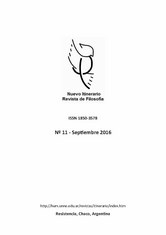Appetite and Recognition in Chapter IV of the Phenomenology of Spirit
DOI:
https://doi.org/10.30972/nvt.1826159Keywords:
Appetite, Recognition, Life and death struggle, Enjoyment, WorkAbstract
This paper proposes, through two specific theses, an alternative and midpoint reading between the two interpretative guidelines that Hegelforschung presents on appetite and recognition in the Phenomenology of Spirit (Ch. IV). Our first thesis, in conformity with the first and against the second, is that recognition, in its concept and movement, is not the humanized spiritualization of appetite, but its cancellation. Our second thesis, in conformity with the second and in opposition to the first, is that the experience of the pure concept of recognizing involves some spiritualizations of appetite. On the one hand, we maintain that the life-and-death struggle presents in a way some parallel with the action of appetite, but because of its object and modality the struggle does not constitute an intersubjective mediation of appetite. On the other hand, we affirm that in the moment of domination and servitude two specific mediations of appetite are consummated: enjoyment and work.
References
Armstrong Kelly, G. (1996). Notes on Hegel´s “Lordship and Bondage”. En J. O´Neil (Ed.), Hegel´s Dialectic of Desire and Recognition: Texts and Commentary (pp. 253-272). Albany: State University of New York Press.
Beiser, F. (2005). Hegel. New York-London: Routledge.
Bertram, G. (2017). Hegels „Phänomenologie des Geistes“. Ein systematischer Kommentar. Ed. Ebook. Stuttgart: Reclam.
Bonsiepen, W. (1988). Einleitung. En Hegel, G. W. F., Phänomenlogie des Geistes (pp. IX-LXIV). Frankfurt am Main: Felix Meiner.
Bowman, B. (2008). Kraft und Verstand. Hegels Übergang zum Selbstbewusstsein in der Phänomenologie des Geistes. En K. Vieweg y W. Welsch (Comps.), Hegels Phänomenologie des Geistes. Ein kooperativer Kommentar zu einem Schlüsselwerk der Moderne (pp. 153-170). Frankfurt: Suhrkamp.
Brandom, R. (2007). The Structure of Desire and Recognition: Self-Consciousness and Self-Constitution. Philosophy and Social Criticism, 33, 127-150.
Butler, J. (1987). Subjects of Desire. Hegelian Reflections in Twentieth-Century France. New York: Columbia University Press.
Butler, J. y Malabou, C. (2010). Sois mon corps. Une lecture contemporaine de la domination et de la servitude chez Hegel. París: Bayard Éditions.
De Zan, J. (2003). La Filosofía práctica de Hegel. Río Cuarto: Ediciones del ICALA.
De Zan, J. (2017). La lucha por el reconocimiento. En Hegel, G. W. F., La primera filosofía del espíritu (pp. 171-198). (J. De Zan, Trad.). Ciudad Autónoma de Buenos Aires: Las cuarenta.
Findlay, J. (1958). Hegel. A Reexamination. New York: Macmillan.
Förster, E. (2008). Hegels „Entdeckungsreisen“, Entstehung und Aufbau der Phänomenologie des Geistes. En K. Vieweg y W. Welsch (Comps.), Hegels Phänomenologie des Geistes. Ein kooperativer Kommentar zu einem Schlüsselwerk der Moderne (pp. 37-57). Frankfurt: Suhrkamp.
Gadamer, H.-G. (1980). Hegels Dialektik des Selbstbewußtsein. En Gadamer, H.-G., Hegels Dialektik: Sechs hermeneutische Studien (pp. 47-64). Tübingen: Mohr.
Hegel, G. W. F. ([1807] 1980). Phänomenologie des Geistes. En Gesammelte Werke [GW], Band 9. (W. Bonsiepen y R. Heede, Eds.). Hamburg: Felix Meiner.
Hegel, G. W. F. Fenomenología del espíritu ([1966] 2007). (W. Roces, Trad). Buenos Aires: Fondo de Cultura Económica.
Hegel, G. W. F. Fenomenología del espíritu (2010). (A. Gómez Ramos, Trad.). Madrid: Abada.
Hegel, G. W. F. Phenomenology of Spirit (1977). (A. V. Miller, Trad.). Oxford: Clarendon Press.
Hegel, G. W. F. Phenomenology of Spirit (2018). (T. Pinkard, Trad.). Cambridge: Cambridge University Press.
Hegel, G. W. F. La Phénoménologie de l’Esprit (1941). (J. Hyppolite, Trad.). París: Aubier - Éditions Montaigne.
Hegel, G. W. F. Fenomenologia dello Spirito (1973). (E. De Negri, Trad.). Firenze: La Nouva Italia.
Hegel, G. W. F. Fenomenologia dello Spirito (1995). (V. Cicero, Trad.). Milano: Rusconi Libri.
Hegel, G. W. F. Fenomenologia do espírito (2003). (P. Meneses, Trad.). Petrópolis: Editora Vozes.
Hegel, G. W. F. ([1812/13) 1978). Wissenschaft der Logik. Erster Band. Die objektive Logik (1812/13). En GW, Band 11. (F. Hogemann y W. Jaeschke, Eds.). Hamburg: Felix Meiner.
Hegel, G. W. F. ([1830] 1992). Enzyklopädie der philosophischen Wissenschaften im Grundrisse (1830). En GW, Band 20. (U. Rameil, W. Bonsiepen y H.-C. Lucas, Eds.). Hamburg: Felix Meiner.
Herszenbaun, M. (2017). La intersubjetividad en las Meditaciones cartesianas y Fenomenología del espíritu. Nuevo Itinerario. Revista de Filosofía, 12, 83-108.
Hoffmann, T. ([2004] 2014). Hegel. Una propedéutica. (M. Mueriera y K. Wrehde, Trad.). Buenos Aires: Biblos.
Honneth, A. (2010). Von der Begierde zur Anerkennung; Hegels Begründung von Selbstbewußtsein. En Honneth, A. Das Ich im Wir. Studien zur Anerkennungstheorie (pp. 15-32). Berlin: Suhrkampp.
Houlgate, S. (2013). Hegel´s Phenomenology of Spirit. A Reader´s Guide. London: Bloomsbury.
Jenkins, S. (2009). Hegel’s Concept of Desire. Journal of the History of Philosophy, 47, 109–130.
Kalkavage, P. (2007). The Logic of Desire. An Introduction to Hegel´s Phenomenology of Spirit. Philadelphia: Paul Dry Books.
Kojève, A. (1947). Introduction à la lecture de Hegel. París: Gallimard.
Labarrière, P.-J. (1979). La Phénoménologie de l’Esprit. Introduction à une lecture. Paris: Éditions Aubier-Montaigne.
McDowell, J. (2007). The Apperceptive I and the Empirical Self: Towards a Heterodox Reading of “Lordship and Bondage. En K. Deligiorgi (Comp.), Hegel’s Phenomenology”. Hegel: New Directions (pp. 33-48). Chesham: Acumen.
Neuhouser, F. (1986). Deducing Desire and Recognition in the Phenomenology of Spirit. Journal of the History of Philosophy, 24-2, 243-262.
Neuhouser, F. (2009). Desire, Recognition, and the Relation between Bondsman and Lord. En K. Westphal (Comps.), The Blackwell Guide to Hegel’s Phenomenology (pp. 37-54). West Sussex: Wiley Blackwell.
O´Neil, J. (1996). Introduction. A Dialectical Genealogy of Self, Society and Culture in and after Hegel”. En J. O´Neil (Comp.), Hegel´s Dialectic of Desire and Recognition: Texts and Commentary (pp. 1-28). Albany: State University of New York Press.
Pinkard, T. (1994). Hegel’s Phenomenology: The Sociality of Reason. Cambridge: Cambridge University Press.
Pippin, R. (2011). Hegel on Self-consciousness. Desire and Death in the Phenomenology of Spirit. Princeton-Oxford: Princeton University Press.
Pöggeler, O. (1973). Hegels Idee einer Phänomenologie des Geistes. Frakfurt am Main: Verlag Karl Alber GmbH.
Pöggeler, O. (2006). Selbstbewußtsein als Leitfaden der Phänomenologie des Geistes. En D. Köhler y O. Pöggeler (Eds.), Phänomenologie des Geistes. Klassiker auslegen, 16, 2 (pp. 131-144). Berlin: Akademie Verlag.
Quante, M. (2010). The Pure Notion of Recognition”: Reflections on the Grammar of the Relation of Recognition in Hegel’s Phenomenology of Spirit. En H.-C. Schmidt am Busch y C. Zurn Laham (Eds.), The Philosophy of Recognition (pp. 89-106). New York: Lexington Books - Rowman & Littlefield Publishers Inc.
Redding, P. (2008). The Independence and Dependence of Self-Consciousness: The Dialectic of Lord and Bondsman in Hegel’s Phenomenology of Spirit. En F. Beiser (Ed.), The Cambridge Companion to Hegel and Nineteenth-century Philosophy (pp. 94-110). Cambridge: Cambridge University Press.
Rendón, C. (2012). La dialéctica del deseo en la Fenomenología del Espíritu de Hegel. Tópicos, 24, 1-16.
Shklar, J. (1996). Self-sufficient Man: Dominion and Bondage. En J. O´Neil (Ed.), Hegel´s Dialectic of Desire and Recognition: Texts and Commentary (pp. 289-304). Albany: State University of New York Press.
Siep, L. (1974). Der Kampf um Anerkennung. Zur Hegels Auseinandersetzung mit Hobbes in den Jenaer Schriften. Hegel-Studien, 9, 155-207.
Siep, L. (1979). Anerkennung als Prinzip der praktischen Philosophie. Untersuchungen zu Hegels Jenaer Philosophie des Geistes. Friburgo-Munich: Verlag Karl Alber.
Siep, L. (2000). Der Weg der Phänomenologie des Geistes. Ein einführender Kommentar zu Hegels ‘Differenzschrift’ und ‘Phänomenologie des Geistes’. Frankfurt: Suhrkamp.
Siep, L. (2006). Die Bewegung des Anerkennes in der Phänomenologie des Geistes. Köhler y O. Pöggeler (Eds.), Phänomenologie des Geistes. Klassiker auslegen, 16, 2 (pp. 109-130). Berlin: Akademie Verlag.
Siep, L. (2009). Anerkennung in Hegels Phänomenologie und der heutigen praktischen Philosophie. En H.-C. Schmidt am Busch und C. Zurn (Eds.), Anerkennung (pp. 107-124). Berlin: Akademie Verlag.
Stern, R. (2013). The Routledge Guidebook to Hegel’s Phenomenology of Spirit. London – New York: Routledge.
Wildt, A. (1982). Autonomie und Anerkennung. Hegels Moralitätskritik im Lichte seiner Fichte-Rezeption. Stuttgart: Klett-Cotta.
Williams, R. (1997). Hegel´s Ethic of Recognition. Berkeley: University of California Press.
Williams, R. (2003). The Concept of Recognition in Hegel´s Phenomenology of Spirit. En A. Denker y M. Vater (Eds.), Hegel´s Phenomenology of Spirit. New Critical Essays (pp. 59-92). New York: Humanity Books.
Downloads
Published
How to Cite
Issue
Section
License
Les autores ceden a Nuevo Itinerario los derechos de publicidad de sus trabajos, toda vez que hayan sido admitidos como parte de alguno de sus números. Ello no obstante, les autores retienen los derechos de propiedad intelectual y responsabilidad ética así como la posibilidad de dar difusión propia por los medios que consideren.












51.jpg)

